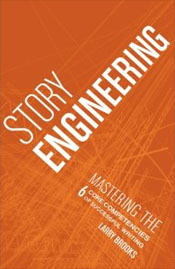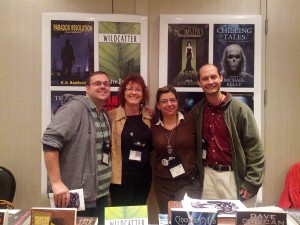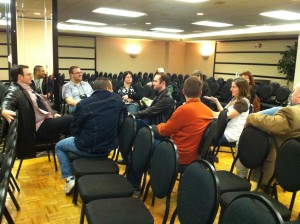 We’re writers, so we write, right? Absolutely.
We’re writers, so we write, right? Absolutely.
But that’s not all we do, and honestly the actual writing of a manuscript is far from the most time-intensive part of creating a novel. In fact, the writing of a viable manuscript is the culmination of a great deal of preparatory effort. We might spend months working on a story before we sit down to write that viable draft.
That final manuscript is like a beautifully crafted building we hope will stand firm for ages, so it must be built upon a firm foundation. Few people visit any architectural wonder just to say, “Wow, great foundation.” Most of us have eyes only for the finished product. Leave it to the architect to know all about the foundation.
Same principle with writing. A great foundation allows a manuscript to reach its full potential. Careful preparation allows a writer to pound out tremendous word count. For example, just yesterday I wrote about 13,000 words. During one writing retreat this year, I wrote 50,000 words in one week. And they were good words, not throw-away fluff.
So, can I write 10,000 words a day, every day of the year? Of course not. Those kind of word counts are not possible unless you’ve already got the foundation set. Much time is spent preparing for those burst of productivity. I’ve discussed those burst-writing times in detail in the past here.
What are some of those foundational items we as authors, the architects of our stories, need to understand? What are ways we can prepare for productivity? The specifics of the list will vary depending on each writer’s style, but regardless of how we get there, we still need to end up with a firm foundation, or the story will fall.
Some common items that apply to just about everyone writing fiction include:
World building. What is our setting? Where is the story taking place? In what environment, what culture, what physical reality? Are characters human or animal or robot or jelly beans? Until we know these things, either written down or firm in our minds, we cannot begin a viable draft.
I write fantasy, and I generate copious notes about the world, the nations, cultures, religions, geography, climate, magic system, value systems, etc. Until it’s real for me, I cannot make it real for my readers.
Characters and conflict. There is no story until there is a conflict. For a conflict to exist and to matter, we need to have characters to torture. Before we craft scenes that will capture readers and draw them into the story, these elements must be clear.
One thing I do at the beginning of a story is to generate a list of names I feel fit this project. In my YA fantasy novel, I chose Scottish names for one nation and German names for another. Behind The Name is an excellent site to find names. Then when I need a name, instead of losing productivity trying to invent one, I just turn to my list, choose a name I’ve already decided will work in the context of this story, and move on with hardly a pause.
For those who are planners, who like to outline and craft a story before sitting down to write that viable manuscript, the list of preparatory items gets a lot longer, including:
Timeline sketches. Particularly for complex stories with multiple characters, charting out the timeline and how the various POV threads will interact can be invaluable. Even if you only have one main character and one main protagonist, the exercise of plotting out when and how they’ll intersect over time can spark new ideas or identify holes in the planned plot.
For me, this helps particularly in complex endings. When tons of things are going on and the action jumps from one POV to another, and from one quick scene to another, weaving all of that in together into a tight, constantly escalating climax is daunting. A high-level timeline sketch keeps it all under control.
Character profiles. Who are your characters, what is their backstory? What do they want? Why can’t they have it? What are they going to do about it? Knowing all this for every main character, and even for important supporting characters provides fodder for tremendous depth and complexity of your story.
Character development and depth has been a challenge for me, and this exercise has helped tremendously.
Outline. How is your plot going to roll out? What scenes will you write to drive the story forward? How exactly will you generate empathy for the hero in the beginning, reveal the true conflict at the first plot point, illustrate the stakes, etc? For planners, the outline is the skeleton, the frame upon which you build the story. This is where great energy and time is spent as you explore all the possibilities.
My outlines keep getting longer. This is where I spend the bulk of my creative thinking time. It’s so much easier for me to explore different options and look for ways to ratchet up tension or stakes or conflict up front than it is after I’ve written 50,000 words and realize something is missing.
For those who prefer to free-write, to discover their story through the act of following the muse down the rabbit hole, the preparation process is more like exploring the back roads around your city at night. There’s a certain excitement to driving into the darkness, not entirely sure where the road will take you. The trip may take a lot longer then expected, you’ll take wrong turns, and have to back track. You may end up needing to return to the very start of your trip and begin anew.
For those free-writers, or pantsers as they’re often called, the early drafts of a story are like those late-night drives in the darkness. This is where you discover the story, just as a planner discovers their story through the outlining process. This effort can take a great deal of time, and through this process, the free-writer is building the foundation of their story. Once all of the necessary elements are in place, only then can the free-writer begin a viable draft that can stand successful.
This list is not exhaustive, but it’s a good place to start. Writers must think about it, particularly as we begin a new novel. Understanding the foundation we must build, regardless of how we choose to get there, is one of the most important things writers need to grasp.
This knowledge, and understanding how we individually approach the foundational elements in our story, allow us to become truly productive. Once we have these elements in place, we can dive into that manuscript, and the words will flow faster than we can write them. I type pretty fast, but sometimes I can barely keep up.
I started as a free-writer, and over time and as I’ve come to better understand these foundational requirements, I have slowly drifted across the spectrum to becoming more of a story planner. I free-write within each scene. This hybrid approach, which I think is fairly common, provides the most focused, most productive result for me while still allowing for some of those midnight drives.
How do you approach these foundational elements in your own stories? What other foundation blocks would you add to the list?




